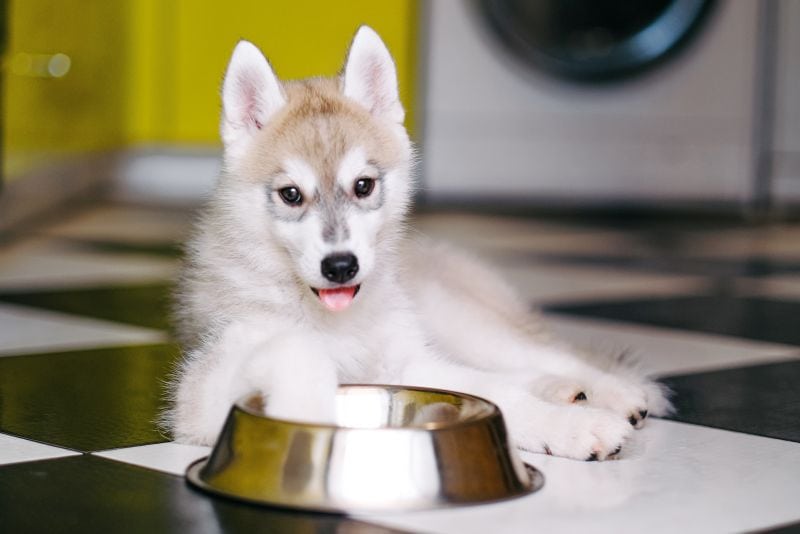Siberian Huskies, with their captivating blue eyes and strikingly wolf-like appearance, are not just aesthetically pleasing but also embody a resilient and spirited breed. Originating from the frosty expanses of Siberia, these dogs were initially bred by the Chukchi people to pull sleds over vast, snow-covered distances. Today, Siberian Huskies have become cherished companions known for their friendly disposition, intelligence, and boundless energy.
With their dense double coat designed to shield them from the harsh Arctic weather, Siberian Huskies necessitate a carefully curated diet to meet their unique nutritional needs. The selection of the best dog food for Siberian Huskies is a pivotal aspect of responsible pet ownership, influencing their overall health, vitality, and the condition of their magnificent coat.
In this comprehensive guide, we will delve into the distinctive dietary requirements of Siberian Huskies and provide invaluable insights to assist you in making informed decisions about their nutrition. Whether you are a seasoned Husky owner or considering bringing one into your home, understanding their nutritional needs is paramount for fostering a happy and thriving canine companion.
Nutritional Requirements:
Protein:
Siberian Huskies, being a highly active and athletic breed, require a diet rich in high-quality protein. Protein plays a crucial role in supporting muscle development, maintaining lean body mass, and sustaining their energy levels. Look for dog foods with identifiable animal protein sources such as chicken, turkey, or fish. A protein content ranging from 18% to 30%, depending on factors like age and activity level, ensures that your Husky receives the essential amino acids vital for their overall well-being.
Fat:
The distinctive double coat of Siberian Huskies demands an adequate supply of healthy fats to keep their skin healthy and their fur lustrous. Essential fatty acids, particularly Omega-3 and Omega-6, contribute to skin integrity and promote a glossy coat. Look for dog foods with a fat content ranging from 8% to 15%, striking the right balance between meeting their energy requirements and supporting coat health.
Carbohydrates:
While Siberian Huskies are not inherently heavy carbohydrate consumers, a moderate amount of complex carbohydrates is still essential for providing the energy they need. Opt for dog foods incorporating carbohydrates from sources like brown rice, sweet potatoes, and peas. Avoid excessive fillers such as corn or soy, as they may contribute to allergies or sensitivities in some Huskies.
Vitamins and Minerals:
A well-rounded dog food should include a comprehensive blend of vitamins and minerals to support various bodily functions. Essential nutrients such as vitamins A, D, and E contribute to vision, bone health, and antioxidant support. Adequate levels of minerals like calcium and phosphorus are essential for maintaining strong bones and teeth.
Avoid Common Allergens:
Siberian Huskies can be sensitive to certain ingredients, making it crucial to avoid common allergens. Opt for dog foods that are free from wheat, corn, and soy, as these ingredients can trigger sensitivities in some individuals. If your Husky exhibits signs of food allergies, consider grain-free or limited-ingredient diets for better digestive health.
Specific Considerations:
Life Stage:
Recognizing the distinct nutritional needs of Siberian Huskies at different life stages is imperative for their overall health and well-being. Husky puppies, in their formative months, require a diet that supports rapid growth and development. Look for high-quality puppy food containing essential nutrients like DHA for brain development and immune support.
As they transition into adulthood, opt for adult dog food formulations that provide a balanced mix of proteins, fats, and carbohydrates to maintain their energy levels and overall health. Senior Huskies may benefit from specialized diets tailored to address aging-related concerns such as joint health and weight management.
Special Dietary Requirements:
Some Siberian Huskies may have specific dietary requirements due to allergies, sensitivities, or underlying health conditions. Monitor your Husky for signs of food allergies, such as itching, gastrointestinal upset, or skin irritations. If sensitivities are identified, consider switching to a limited-ingredient diet or consulting with a veterinarian to explore hypoallergenic options. Additionally, dogs with specific health concerns, such as renal issues or allergies, may benefit from prescription diets formulated to address these conditions. Always consult with your veterinarian to determine if a specialized diet is necessary for your individual Husky.
Activity Level:
Siberian Huskies are known for their boundless energy and love for physical activity. Consider your Husky’s activity level when selecting their food, as more active dogs may require a higher calorie intake. Working breeds like Huskies may benefit from diets designed for active or performance dogs, ensuring they receive the necessary energy to support their adventurous lifestyle.
Weight Management:
Maintaining a healthy weight is crucial for the overall well-being of Siberian Huskies. Obesity can lead to various health issues, including joint problems and reduced lifespan. Choose a dog food with appropriate calorie content for your Husky’s age, activity level, and body condition. Monitor their weight regularly and adjust their diet as needed to prevent excessive weight gain or loss.
Individual Preferences:
Just like humans, dogs have individual preferences when it comes to taste and texture. Experiment with different brands and formulations to find a dog food that not only meets their nutritional needs but also suits their palate. Providing a balanced and appetizing diet ensures that your Siberian Husky looks forward to mealtime and receives the nutrients they need for optimal health.
Top Picks for Siberian Huskies:
- Blue Buffalo Wilderness Grain-Free Chicken Recipe:
- This premium dog food offers a grain-free formula with deboned chicken as the primary protein source.
- Rich in antioxidants, vitamins, and minerals to support overall health and immune function.
- Contains Omega-3 and Omega-6 fatty acids for a healthy coat and skin.
- Royal Canin Siberian Husky Adult Dry Dog Food:
- Specifically formulated to meet the nutritional needs of Siberian Huskies, this breed-specific dog food supports skin health and a vibrant coat.
- Includes essential nutrients for joint support, promoting mobility in this active breed.
- Tailored kibble shape and size encourage chewing, promoting dental health.
- Wellness CORE Grain-Free Original Recipe:
- A grain-free option with high-quality proteins, including turkey and chicken.
- Contains a balanced blend of antioxidants, probiotics, and Omega fatty acids for overall well-being.
- Suitable for dogs with food sensitivities, as it excludes common allergens.
- Merrick Grain-Free Real Texas Beef & Sweet Potato Recipe:
- Featuring real deboned beef as the main ingredient, this grain-free formula provides high-quality protein.
- Includes sweet potatoes for a complex carbohydrate source and added vitamins and minerals.
- Free from artificial preservatives and colors.
- Nutro Ultra Grain-Free Dry Dog Food:
- Crafted with a trio of proteins from chicken, lamb, and salmon to support lean muscle development.
- Contains a blend of superfoods, such as blueberries and chia seeds, for added nutritional benefits.
- Grain-free and free from artificial colors, flavors, and preservatives.
Conclusion:
In conclusion, selecting the best dog food for your Siberian Husky is a crucial responsibility that directly impacts their health, vitality, and overall well-being. These majestic and energetic dogs require a nutritionally balanced diet that caters to their unique breed characteristics, ensuring they thrive in every aspect of their lives.
By prioritizing high-quality proteins, healthy fats, and essential nutrients, you provide your Siberian Husky with the foundation for a strong and healthy body. The coat, a hallmark feature of this breed, benefits from the inclusion of Omega-3 and Omega-6 fatty acids, promoting skin health and a glossy appearance. Avoiding common allergens, such as wheat, corn, and soy, is essential in preventing potential sensitivities that some Huskies may experience.
Specific considerations, including life stage, dietary requirements, activity level, and individual preferences, play a pivotal role in tailoring your Husky’s diet. Whether you have a lively puppy, an active adult, or a wise senior, adapting their food to their changing needs ensures they receive the necessary nutrients for each life stage.
FAQs
Q1: What is the ideal protein content for Siberian Husky dog food?
A1: Siberian Huskies, being an active breed, benefit from a protein content ranging between 18% to 30%, depending on factors like age, activity level, and health. High-quality animal protein sources, such as chicken or fish, contribute to their muscle development and overall well-being.
Q2: Is a grain-free diet necessary for Siberian Huskies?
A2: While not strictly necessary, many Siberian Huskies thrive on grain-free diets. Opting for grain-free options with alternative carbohydrate sources like sweet potatoes or peas can be beneficial, especially for dogs with sensitivities or allergies to common grains.
Q3: Are there specific considerations for feeding Siberian Husky puppies?
A3: Yes, Siberian Husky puppies have unique nutritional needs to support their rapid growth and development. Look for puppy formulations with DHA for brain development and essential nutrients for overall growth. Transition to adult food gradually based on your veterinarian’s recommendations.
Q4: How can I manage my Siberian Husky’s weight effectively?
A4: To manage your Husky’s weight, choose a dog food with an appropriate calorie content based on their age, activity level, and body condition. Monitor their weight regularly, adjust portions as needed, and incorporate regular exercise into their routine to maintain a healthy weight.
Q5: Can Siberian Huskies have food allergies?
A5: Yes, Siberian Huskies can develop food sensitivities or allergies. Common allergens include wheat, corn, and soy. If you notice signs such as itching, gastrointestinal upset, or skin irritations, consider switching to a limited-ingredient or hypoallergenic diet. Consult with your veterinarian for guidance.
Q6: Are there specific dog food brands recommended for Siberian Huskies?
A6: While individual preferences and sensitivities vary, some recommended dog food brands for Siberian Huskies include Blue Buffalo Wilderness, Royal Canin, Wellness CORE, Merrick, and Nutro Ultra. However, it’s essential to consider your dog’s specific needs and consult with your veterinarian for personalized recommendations.

Jane Doe, a veterinarian with over 10 years of experience, combines her deep knowledge of animal health with a passion for pet welfare at PetsPonder.com. With a DVM degree and a commitment to the latest in veterinary science, Jane Doe offers reliable, compassionate advice to help pet owners make informed decisions for their furry companions.

Leave a Reply